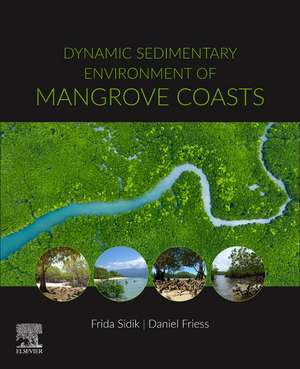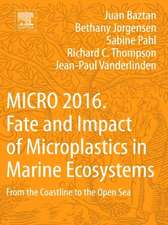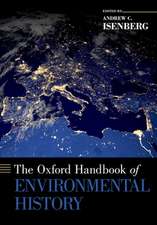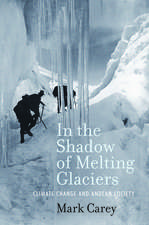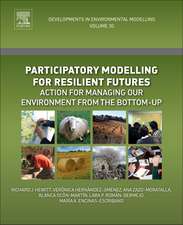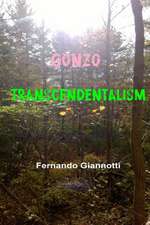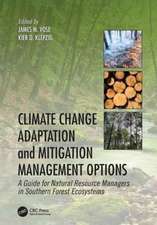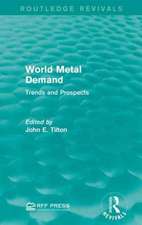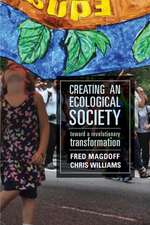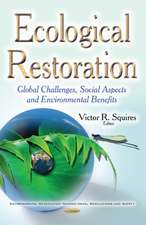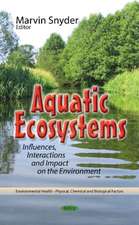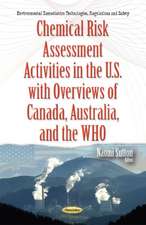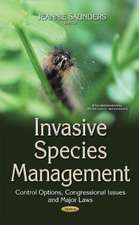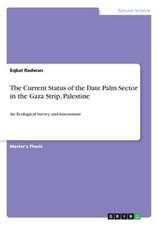Dynamic Sedimentary Environments of Mangrove Coasts
Editat de Daniel Friess, Frida Sidiken Limba Engleză Paperback – 10 dec 2020
- Provides a state-of-the-art summary of research into sedimentary dynamics in mangrove forests
- Includes updates on issues of climate change-relevant to mangroves, such as blue carbon and sea level rise
- Presents scientific background and successful case studies for mangrove restoration that can solve problems relating to mangrove management
Preț: 699.38 lei
Preț vechi: 907.77 lei
-23% Nou
Puncte Express: 1049
Preț estimativ în valută:
133.87€ • 145.46$ • 112.52£
133.87€ • 145.46$ • 112.52£
Carte tipărită la comandă
Livrare economică 14-28 aprilie
Livrare express 15-21 martie pentru 98.83 lei
Preluare comenzi: 021 569.72.76
Specificații
ISBN-13: 9780128164372
ISBN-10: 0128164379
Pagini: 650
Dimensiuni: 191 x 235 x 40 mm
Greutate: 1.1 kg
Editura: ELSEVIER SCIENCE
ISBN-10: 0128164379
Pagini: 650
Dimensiuni: 191 x 235 x 40 mm
Greutate: 1.1 kg
Editura: ELSEVIER SCIENCE
Public țintă
The primary market is advanced undergraduate students, graduate students, researchers, academics and coastal management practitioners.The secondary market is the decision makers including NGOs, Development Partners and general reading public with limited natural resource background as it is designed with case studies and current issues
Cuprins
Introduction
Part 1. Biogeomorphological processes
1. Biogeomorphic evolution and expansion of mangrove forests in New Zealand’s sediment-rich estuarine systems
2. Mangroves: a natural early warning system of erosion of open muddy coasts in French Guiana
3. Groundwater research in mangrove coastal ecosystems - new prospects
4. Flow and sediment dynamics around structures in mangrove ecosystems - a modelling perspective
5. Morphological plasticity and survival thresholds of mangrove plants growing in active sedimentary environments
6. Microbial communities in mangrove sediments
Part 2. Long-term sedimentary processes and sea-level rise
7. The history of surface-elevation paradigms in mangrove biogeomorphology
8. Radiocarbon dating of mangrove sediments
9. Australian mangroves through the Holocene: interactions between sea-level, mangrove extent and carbon sequestration
10. Responses of mangrove ecosystems to sea level change
11. Does geomorphology determine vulnerability of mangrove coasts to sea-level rise?
Part 3. Blue Carbon
12. Environmental drivers of blue carbon burial and soil carbon stocks in mangrove forests
13. Gaps and opportunities in mangrove blue carbon research: a biogeographic perspective
14. State of biogeochemical blue carbon in South Asian mangroves
15. Quantity and quality of organic matter in mangrove sediments
16. Relevance of allochthonous input from an agriculture-dominated hinterland for 'blue carbon' storage in mangrove sediments in Java, Indonesia
17. Potential carbon loss in sediment through methane production during early development stage of mangrove regeneration in restored mangroves
18. Blue carbon storage comparing mangroves with salt marsh and seagrass habitats at a warm temperate continental limit
19. Mangrove carbon sequestration and sediment deposition changes under cordgrass invasion
Part 4. Mangrove management and restoration
20. A framework for the quantitative assessment of mangrove resilience
21. Assessment of typhoon impacts and post-typhoon recovery in Philippine mangroves: Lessons and challenges for adaptive management
22. Managing sediment dynamics through reintroduction of tidal flow for mangrove restoration in abandoned aquaculture ponds
23. Impacts of forestry on mangrove sediment dynamics
Conclusions
Part 1. Biogeomorphological processes
1. Biogeomorphic evolution and expansion of mangrove forests in New Zealand’s sediment-rich estuarine systems
2. Mangroves: a natural early warning system of erosion of open muddy coasts in French Guiana
3. Groundwater research in mangrove coastal ecosystems - new prospects
4. Flow and sediment dynamics around structures in mangrove ecosystems - a modelling perspective
5. Morphological plasticity and survival thresholds of mangrove plants growing in active sedimentary environments
6. Microbial communities in mangrove sediments
Part 2. Long-term sedimentary processes and sea-level rise
7. The history of surface-elevation paradigms in mangrove biogeomorphology
8. Radiocarbon dating of mangrove sediments
9. Australian mangroves through the Holocene: interactions between sea-level, mangrove extent and carbon sequestration
10. Responses of mangrove ecosystems to sea level change
11. Does geomorphology determine vulnerability of mangrove coasts to sea-level rise?
Part 3. Blue Carbon
12. Environmental drivers of blue carbon burial and soil carbon stocks in mangrove forests
13. Gaps and opportunities in mangrove blue carbon research: a biogeographic perspective
14. State of biogeochemical blue carbon in South Asian mangroves
15. Quantity and quality of organic matter in mangrove sediments
16. Relevance of allochthonous input from an agriculture-dominated hinterland for 'blue carbon' storage in mangrove sediments in Java, Indonesia
17. Potential carbon loss in sediment through methane production during early development stage of mangrove regeneration in restored mangroves
18. Blue carbon storage comparing mangroves with salt marsh and seagrass habitats at a warm temperate continental limit
19. Mangrove carbon sequestration and sediment deposition changes under cordgrass invasion
Part 4. Mangrove management and restoration
20. A framework for the quantitative assessment of mangrove resilience
21. Assessment of typhoon impacts and post-typhoon recovery in Philippine mangroves: Lessons and challenges for adaptive management
22. Managing sediment dynamics through reintroduction of tidal flow for mangrove restoration in abandoned aquaculture ponds
23. Impacts of forestry on mangrove sediment dynamics
Conclusions
